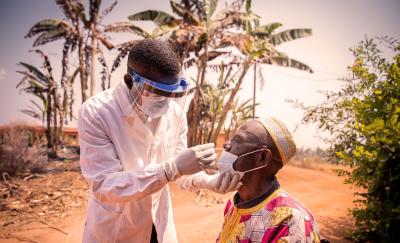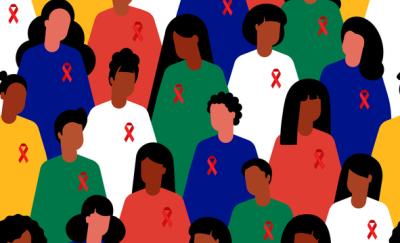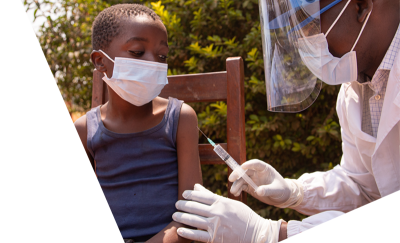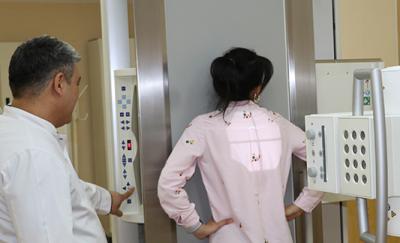How Peer Counselors are Unlocking Kazakhstan's Path to Tuberculosis Eradication


In Almaty, Kazakhstan, as in much of the world, tuberculosis (TB) carries a stigma. That often makes people who contract the disease reluctant to acknowledge and treat it, creating opportunities for TB to spread.
One effective way of dealing with this dynamic is peer-to-peer support groups. People who have contracted TB and been through treatment can provide a safe space for at least some of the 450 people in Almaty diagnosed with TB each year, including more than a quarter with harder-to-treat drug-resistant forms of the disease. "A self-help group is a place where you don't have to hide anything," said Malik, a group member. "You don't have to hide the fact that you have tuberculosis."
That’s why building a TB community in Almaty is vital, said Valery Shtekel, a peer counselor from the Kazakh NGO Revansh. "People from vulnerable groups can face many problems and get demotivated, especially when they are sick,” he notes. “Only someone who has already overcome such barriers can help others get through their difficulties.”
A successful support group doesn’t arise spontaneously, though. It requires training, and that’s where the Abt-led USAID Eliminating TB in Central Asia (ETICA) Activity comes in. It collaborates with the Kazakhstan National TB Program to train local NGOs and people like Shtekel to conduct peer-to-peer support among people with the disease.
Shtekel and his colleague Igor Livaza began their counseling careers by supporting people with HIV. In 2020, after an Almaty-based NGO that provided TB services closed, the pair started receiving more questions from people with TB, which they didn’t know how to answer.


"It's hard when a client comes to you, and you can't help him or her because you don't have enough knowledge yourself," Shtekel explained. "TB has its own particulars: how to get tested, how to avoid spreading the disease, who qualifies for inpatient or outpatient treatment, what [state] benefits people with TB can qualify for. To help someone, you need to be well aware of these issues."
In November 2021, Shtekel and Livaza read an announcement about USAID ETICA’s "First Among Peers," a step-by-step guide on TB peer counseling and advocacy. They joined 14 others for four weeks of training, learning the principles of working with people affected by TB and how to develop TB communities.
Following the training, trainees organized TB self-support groups. Shtekel and Livaza worked with USAID ETICA to develop a concept paper on the work of self-support groups. They shared the concept paper, highlighting their process and goals, with the TB Center in Almaty and the City Department of Public Health's decision-makers.
In March 2022, Shtekel and Livaza's work resulted in the signing of a Memorandum of Cooperation and the organizing of the first meeting for people affected by TB at the TB Center. The weekly meetings connect members with information and psychological and social services plus advice from people who have overcome similar life difficulties. Members can access USAID ETICA-funded support or guidance by phone 24/7 .


Since March 2022, 155 people affected by TB have attended group meetings hosted by Shtekel, Livaza, and other trained peer counselors. Everyone has stuck with their treatments, including three who completed treatment for drug-resistant TB.
Now Shtekel and Livaza are taking their efforts a step further. With support from USAID ETICA, they started holding information sessions for self-support group members interested in learning how to become peer counselors and provide psychological and social support. "[T]here is a lot of work, but there are few peer TB consultants,” Livaza said. “So we started to train TB patients in the skills that we learned."
Their goal, Shtekel added: trainees able to launch new TB communities and maybe even an NGO.
Read More
Infectious Diseases & Global Health Security in South & Central Asia

Global Health Security: 2024 Year in Review
Abt Global’s top global health security insights from 2024 as we look ahead to 2025.

Sharing Lessons to End the HIV Epidemic in the U.S. and Abroad
This white paper explains how bi-directional learning from the U.S.-focused RWHAP program and the international PEPFAR program can help end the HIV epidemic.

Global Health Security Conference (GHS) 2024
Abt Global is sponsoring the Global Health Security Conference on June 18-21 in Sydney, Australia.

Uzbekistan Launches New TB Funding Mechanism
Uzbekistan is moving from paying TB hospitals based on occupied beds to compensation based on the number of patients treated.
Regions
- Asia & Pacific